人教版(2019)选择性必修 第二册Unit 1 Science and Scientists Access your progress 课件(共20张PPT)
文档属性
| 名称 | 人教版(2019)选择性必修 第二册Unit 1 Science and Scientists Access your progress 课件(共20张PPT) | 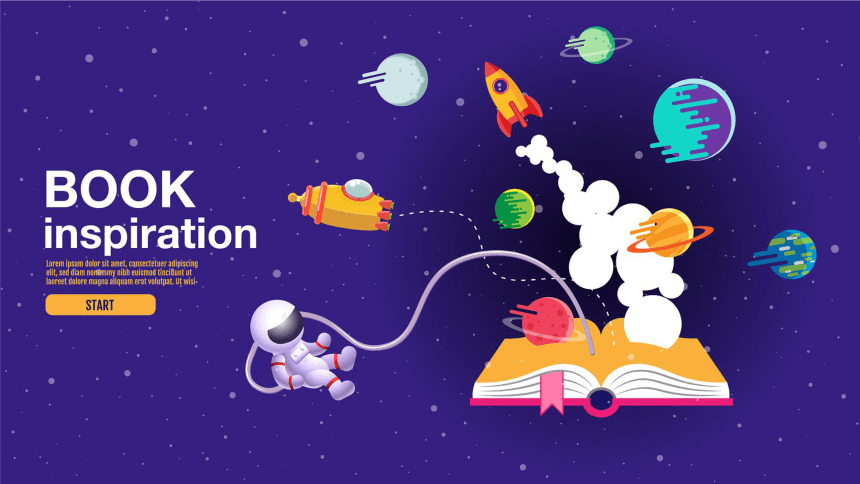 | |
| 格式 | zip | ||
| 文件大小 | 1.5MB | ||
| 资源类型 | 教案 | ||
| 版本资源 | 人教版(2019) | ||
| 科目 | 英语 | ||
| 更新时间 | 2023-02-08 16:25:57 | ||
图片预览

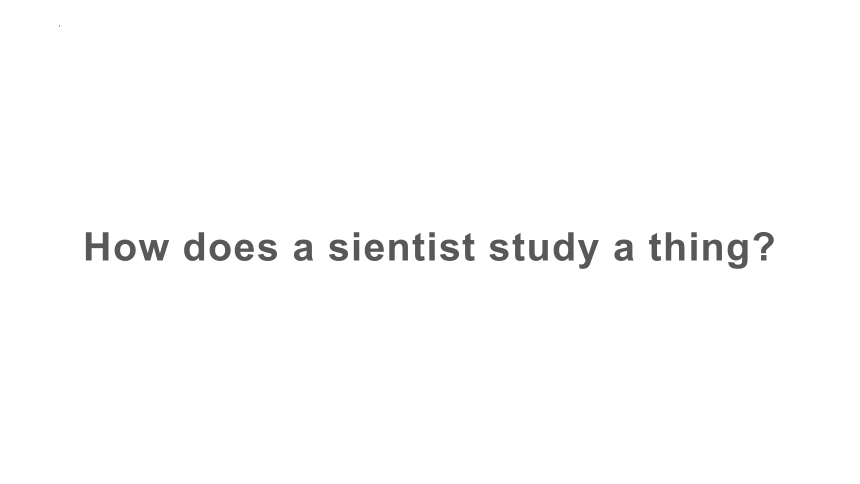
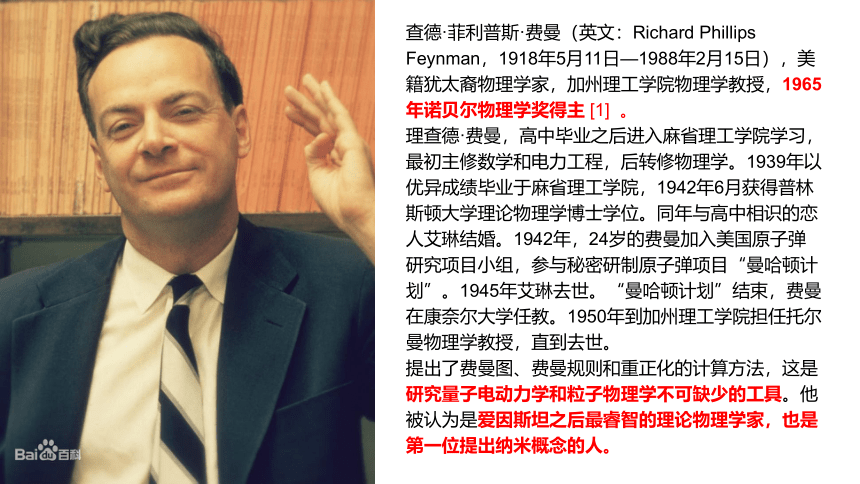
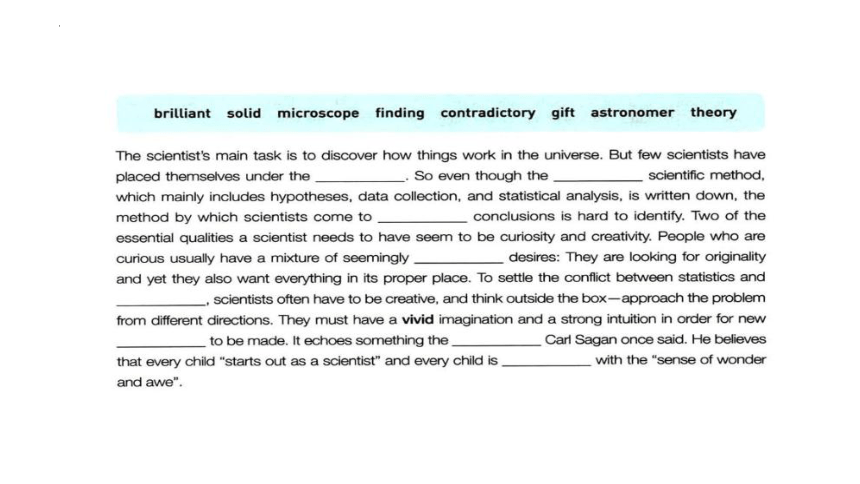
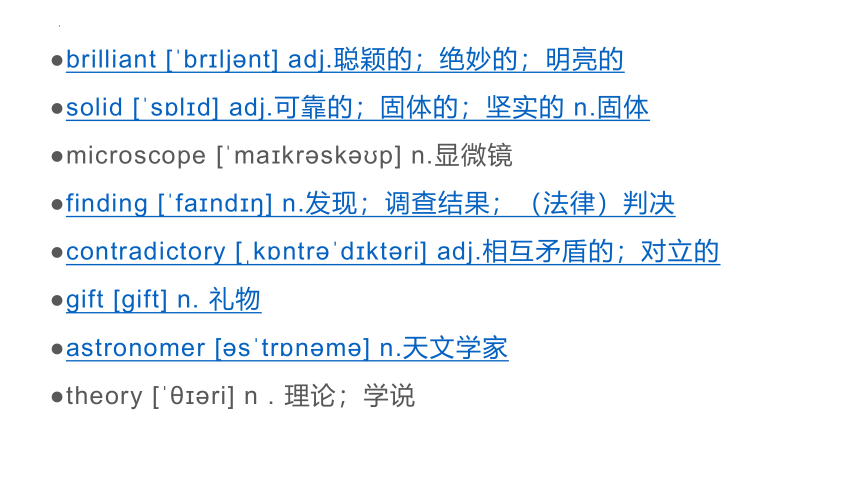
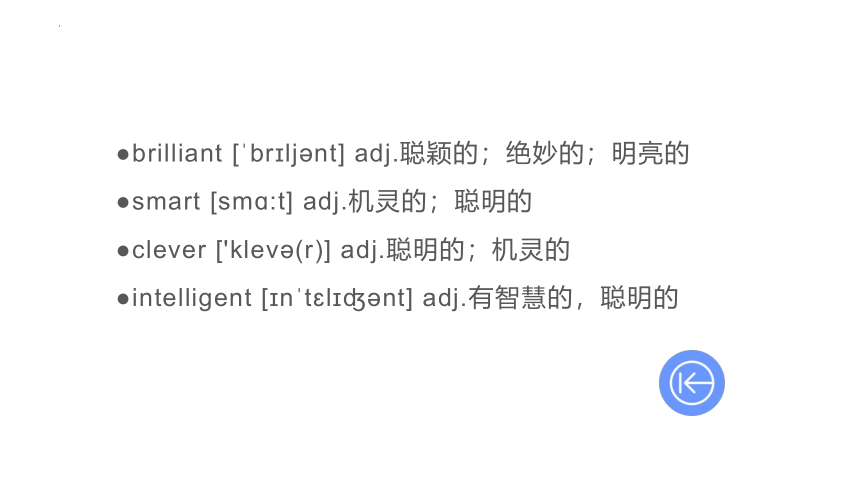
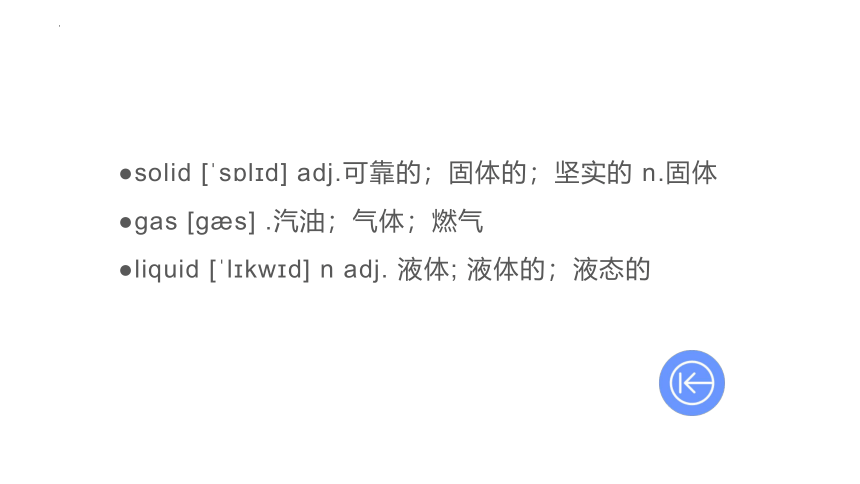
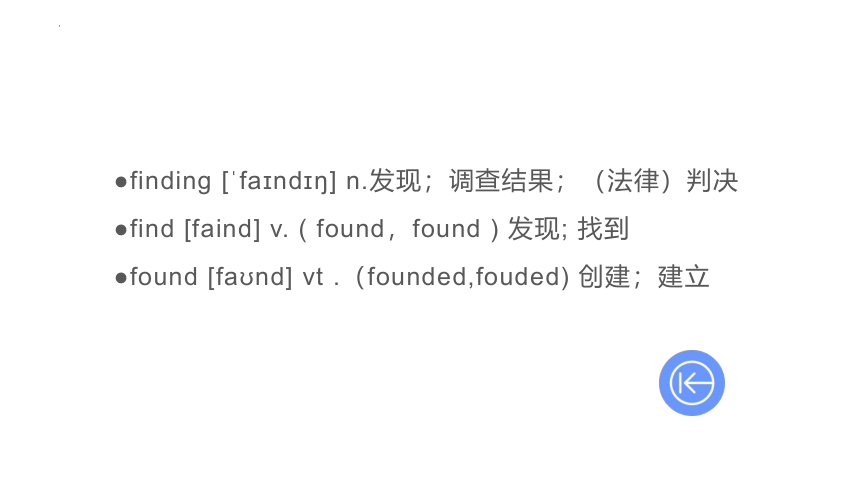
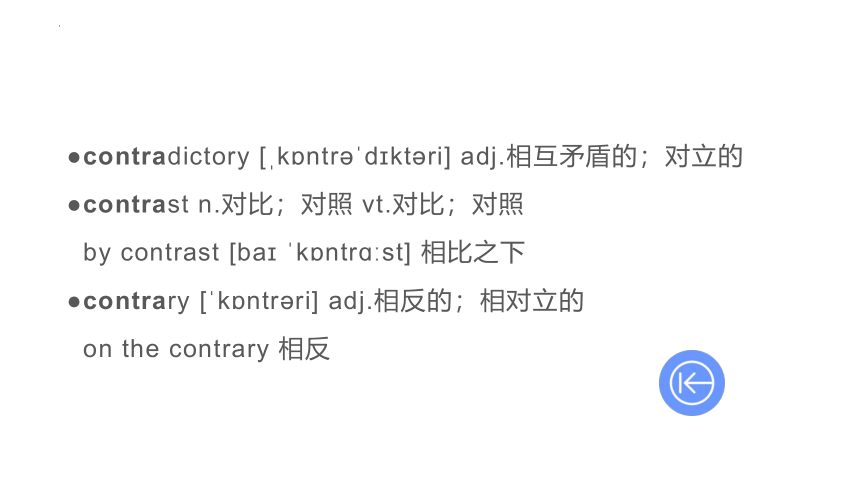
文档简介
(共20张PPT)
How does a sientist study a thing
查德·菲利普斯·费曼(英文:Richard Phillips Feynman,1918年5月11日—1988年2月15日),美籍犹太裔物理学家,加州理工学院物理学教授,1965年诺贝尔物理学奖得主 [1] 。
理查德·费曼,高中毕业之后进入麻省理工学院学习,最初主修数学和电力工程,后转修物理学。1939年以优异成绩毕业于麻省理工学院,1942年6月获得普林斯顿大学理论物理学博士学位。同年与高中相识的恋人艾琳结婚。1942年,24岁的费曼加入美国原子弹研究项目小组,参与秘密研制原子弹项目“曼哈顿计划”。1945年艾琳去世。“曼哈顿计划”结束,费曼在康奈尔大学任教。1950年到加州理工学院担任托尔曼物理学教授,直到去世。
提出了费曼图、费曼规则和重正化的计算方法,这是研究量子电动力学和粒子物理学不可缺少的工具。他被认为是爱因斯坦之后最睿智的理论物理学家,也是第一位提出纳米概念的人。
brilliant [ br lj nt] adj.聪颖的;绝妙的;明亮的
solid [ s l d] adj.可靠的;固体的;坚实的 n.固体
microscope [ ma kr sk p] n.显微镜
finding [ fa nd ] n.发现;调查结果;(法律)判决
contradictory [ k ntr d kt ri] adj.相互矛盾的;对立的
gift [ɡift] n. 礼物
astronomer [ s tr n m ] n.天文学家
theory [ θ ri] n . 理论;学说
brilliant [ br lj nt] adj.聪颖的;绝妙的;明亮的
smart [smɑ:t] adj.机灵的;聪明的
clever ['klev (r)] adj.聪明的;机灵的
intelligent [ n t l nt] adj.有智慧的,聪明的
solid [ s l d] adj.可靠的;固体的;坚实的 n.固体
gas [g s] .汽油;气体;燃气
liquid [ l kw d] n adj. 液体; 液体的;液态的
finding [ fa nd ] n.发现;调查结果;(法律)判决
find [faind] v. ( found,found ) 发现; 找到
found [fa nd] vt .(founded,fouded) 创建;建立
contradictory [ k ntr d kt ri] adj.相互矛盾的;对立的
contrast n.对比;对照 vt.对比;对照
by contrast [ba k ntrɑ st] 相比之下
contrary [ k ntr ri] adj.相反的;相对立的
on the contrary 相反
gift [ɡift] n. 礼物
gifted [ g ft d] adj.有天赋的;有天才的
be gifted with 具有...天赋
talent n.天才;天资;天赋
genius [ i ni s] n.(pl. genuses) 天才;天资
present ['preznt] n.礼物; 现在
astronomer [ s tr n m ] n.天文学家
astronomy [ s tr n mi] n.天文学
astronaut [ str n t] n.宇航员;太空人
spaceman [ spe sm n] n.宇航员; 航天员
The scientist’s main task(任务) is to discover how things work in the universe. But few scientists have placed(放置) themselves under the __________. So even though the _______ scientific method(方法), which mainly includes hypotheses(假设), data collection, and statistical(数据) analysis, is written down, the method by which scientists come to(得出) _____ conclusions(结论) is hard to identify(确定).
brilliant solid microscope finding
contradictory gift astronomer theory
microscope
brilliant
solid
Two of the essential(基本的) qualities a scientist needs to have seem to be curiosity(好奇心) and creativity(创造性). People who are curious usually have a mixture(混合) of seemingly(似乎) ___________ desires(渴望): They are looking for originality(原创性) and yet they also want everything in its proper(适当的) place. To settle(解决) the conflict(矛盾) between statistics and ______.
contradictory
theory
brilliant solid microscope finding
contradictory gift astronomer theory
Scientists often have to be creative, and think outside the box—approach(接近) the problem from different directions(方向). They must have a vivid(生动的) imagination(想象力) and a strong intuition(直觉) in order for new _______ to be made. It echoes something the _________ Carl Sagan once said. He believes that every child “starts out as a scientist” and every child is _____ with the “sense of wonder(好奇) and awe”(敬畏).
findings
astronomer
gifted
brilliant solid microscope finding
contradictory gift astronomer theory
Can an ordinary person become a scientist
Read the passage again and answer the following questions.
1. What does “think outside the box” mean
To approach the problem from different directions; to be creative.
2. What qualities can be added to the scientific spirit list according to this passage
Curiosity, creativity, a vivid imagination and a strong intuition, a sense of wonder and awe.
Science is simply _____ you can do. And doing science makes you a scientist!So, what do scientists do Actually, what matters(重要) is not only they observe(观察) in the world around them and what questions they ask, but also they use evidence(证据) or data to answer the questions. They identify(确定) useful data and take new measurements(测量).
that what why how because
what
how
what
Some of the key issues(议题) that scientists face are _____ calculations(计算) they do and _____ they analyse(分析) their data to draw conclusions about the questions they ask. The final issue, which many believe to be the most important, is _____ they need to communicate(交流) their results. This is ________they want everyone to benefit(获益) from their work! It seems(似乎) science is all around us. You see, by doing science, scientists get a better understanding of the world around them and share that understanding with the whole world.
what
how
why
because
that/as if
that what why how because
How does a sientist study a thing
查德·菲利普斯·费曼(英文:Richard Phillips Feynman,1918年5月11日—1988年2月15日),美籍犹太裔物理学家,加州理工学院物理学教授,1965年诺贝尔物理学奖得主 [1] 。
理查德·费曼,高中毕业之后进入麻省理工学院学习,最初主修数学和电力工程,后转修物理学。1939年以优异成绩毕业于麻省理工学院,1942年6月获得普林斯顿大学理论物理学博士学位。同年与高中相识的恋人艾琳结婚。1942年,24岁的费曼加入美国原子弹研究项目小组,参与秘密研制原子弹项目“曼哈顿计划”。1945年艾琳去世。“曼哈顿计划”结束,费曼在康奈尔大学任教。1950年到加州理工学院担任托尔曼物理学教授,直到去世。
提出了费曼图、费曼规则和重正化的计算方法,这是研究量子电动力学和粒子物理学不可缺少的工具。他被认为是爱因斯坦之后最睿智的理论物理学家,也是第一位提出纳米概念的人。
brilliant [ br lj nt] adj.聪颖的;绝妙的;明亮的
solid [ s l d] adj.可靠的;固体的;坚实的 n.固体
microscope [ ma kr sk p] n.显微镜
finding [ fa nd ] n.发现;调查结果;(法律)判决
contradictory [ k ntr d kt ri] adj.相互矛盾的;对立的
gift [ɡift] n. 礼物
astronomer [ s tr n m ] n.天文学家
theory [ θ ri] n . 理论;学说
brilliant [ br lj nt] adj.聪颖的;绝妙的;明亮的
smart [smɑ:t] adj.机灵的;聪明的
clever ['klev (r)] adj.聪明的;机灵的
intelligent [ n t l nt] adj.有智慧的,聪明的
solid [ s l d] adj.可靠的;固体的;坚实的 n.固体
gas [g s] .汽油;气体;燃气
liquid [ l kw d] n adj. 液体; 液体的;液态的
finding [ fa nd ] n.发现;调查结果;(法律)判决
find [faind] v. ( found,found ) 发现; 找到
found [fa nd] vt .(founded,fouded) 创建;建立
contradictory [ k ntr d kt ri] adj.相互矛盾的;对立的
contrast n.对比;对照 vt.对比;对照
by contrast [ba k ntrɑ st] 相比之下
contrary [ k ntr ri] adj.相反的;相对立的
on the contrary 相反
gift [ɡift] n. 礼物
gifted [ g ft d] adj.有天赋的;有天才的
be gifted with 具有...天赋
talent n.天才;天资;天赋
genius [ i ni s] n.(pl. genuses) 天才;天资
present ['preznt] n.礼物; 现在
astronomer [ s tr n m ] n.天文学家
astronomy [ s tr n mi] n.天文学
astronaut [ str n t] n.宇航员;太空人
spaceman [ spe sm n] n.宇航员; 航天员
The scientist’s main task(任务) is to discover how things work in the universe. But few scientists have placed(放置) themselves under the __________. So even though the _______ scientific method(方法), which mainly includes hypotheses(假设), data collection, and statistical(数据) analysis, is written down, the method by which scientists come to(得出) _____ conclusions(结论) is hard to identify(确定).
brilliant solid microscope finding
contradictory gift astronomer theory
microscope
brilliant
solid
Two of the essential(基本的) qualities a scientist needs to have seem to be curiosity(好奇心) and creativity(创造性). People who are curious usually have a mixture(混合) of seemingly(似乎) ___________ desires(渴望): They are looking for originality(原创性) and yet they also want everything in its proper(适当的) place. To settle(解决) the conflict(矛盾) between statistics and ______.
contradictory
theory
brilliant solid microscope finding
contradictory gift astronomer theory
Scientists often have to be creative, and think outside the box—approach(接近) the problem from different directions(方向). They must have a vivid(生动的) imagination(想象力) and a strong intuition(直觉) in order for new _______ to be made. It echoes something the _________ Carl Sagan once said. He believes that every child “starts out as a scientist” and every child is _____ with the “sense of wonder(好奇) and awe”(敬畏).
findings
astronomer
gifted
brilliant solid microscope finding
contradictory gift astronomer theory
Can an ordinary person become a scientist
Read the passage again and answer the following questions.
1. What does “think outside the box” mean
To approach the problem from different directions; to be creative.
2. What qualities can be added to the scientific spirit list according to this passage
Curiosity, creativity, a vivid imagination and a strong intuition, a sense of wonder and awe.
Science is simply _____ you can do. And doing science makes you a scientist!So, what do scientists do Actually, what matters(重要) is not only they observe(观察) in the world around them and what questions they ask, but also they use evidence(证据) or data to answer the questions. They identify(确定) useful data and take new measurements(测量).
that what why how because
what
how
what
Some of the key issues(议题) that scientists face are _____ calculations(计算) they do and _____ they analyse(分析) their data to draw conclusions about the questions they ask. The final issue, which many believe to be the most important, is _____ they need to communicate(交流) their results. This is ________they want everyone to benefit(获益) from their work! It seems(似乎) science is all around us. You see, by doing science, scientists get a better understanding of the world around them and share that understanding with the whole world.
what
how
why
because
that/as if
that what why how because
